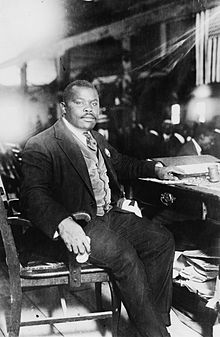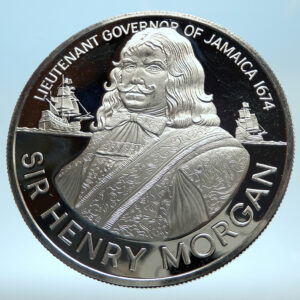|
Jamaica
Excellent Marcus Garvey
1976 Proof Copper-Nickel 50 Cents 31mm (12.45 grams)
Reference: KM# 70
JAMAICA FIFTY 1977 CENTS OUT OF MANY ONE PEOPLE FM, Coat of Arms of Jamaica within beaded circle.
THE RT. EXCELLENT MARCUS GARVEY 1887-1940, Bust of Marcus Garvey facing slightly to the right.
You are bidding on the exact item pictured, provided with a Certificate of Authenticity and Lifetime Guarantee of Authenticity.
 Marcus Mosiah Garvey Sr. ONH (17 August 1887 – 10 June 1940) was a Jamaican political activist, publisher, journalist, entrepreneur, and orator. He was the founder and first President-General of the Universal Negro Improvement Association and African Communities League (UNIA-ACL, commonly known as UNIA), through which he declared himself Provisional President of Africa. Ideologically a black nationalist and Pan-Africanist, his ideas came to be known as Garveyism. Marcus Mosiah Garvey Sr. ONH (17 August 1887 – 10 June 1940) was a Jamaican political activist, publisher, journalist, entrepreneur, and orator. He was the founder and first President-General of the Universal Negro Improvement Association and African Communities League (UNIA-ACL, commonly known as UNIA), through which he declared himself Provisional President of Africa. Ideologically a black nationalist and Pan-Africanist, his ideas came to be known as Garveyism.
Garvey was born to a moderately prosperous Afro-Jamaican family in Saint Ann’s Bay, Jamaica, and apprenticed into the print trade as a teenager. Working in Kingston, he became involved in trade unionism before living briefly in Costa Rica, Panama, and England. Returning to Jamaica, he founded UNIA in 1914. In 1916, he moved to the United States and established a UNIA branch in New York City’s Harlem district. Emphasising unity between Africans and the African diaspora, he campaigned for an end to European colonial rule across Africa and the political unification of the continent. He envisioned a unified Africa as a one-party state, governed by himself, that would enact laws to ensure black racial purity. Although he never visited the continent, he was committed to the Back-to-Africa movement, arguing that some people of African descent should migrate there. Garveyist ideas became increasingly popular and UNIA grew in membership. However, his black separatist views—and his relations with white racists such as the Ku Klux Klan (KKK) to advance their shared interest in racial separatism—divided Garvey from other prominent African-American civil rights activists such as W. E. B. Du Bois who promoted racial integration.
Committed to the belief that black people needed to secure financial independence from white-dominant society, Garvey launched various businesses in the U.S., including the Negro Factories Corporation and Negro World newspaper. In 1919, he became President of the Black Star Line shipping and passenger company, designed to forge a link between North America and Africa and facilitate African-American migration to Liberia. In 1923 Garvey was convicted of mail fraud for selling the company’s stock and imprisoned in the United States Penitentiary Atlanta for nearly two years. Many commentators have argued that the trial was politically motivated; Garvey blamed Jewish people, claiming that they were prejudiced against him because of his links to the KKK. Deported to Jamaica in 1927, where he settled in Kingston with his wife Amy Jacques, Garvey continued his activism and established the People’s Political Party in 1929, briefly serving as a city councillor. With UNIA in increasing financial difficulty, in 1935 he relocated to London, where his anti-socialist stance distanced him from many of the city’s black activists. He died there in 1940, although in 1964 his body was returned to Jamaica for reburial in Kingston’s National Heroes Park.
Garvey was a controversial figure. Some in the African diasporic community regarded him as a pretentious demagogue and were highly critical of his collaboration with white supremacists, his violent rhetoric, and his prejudice against mixed-race people and Jews. He nevertheless received praise for encouraging a sense of pride and self-worth among Africans and the African diaspora amid widespread poverty, discrimination, and colonialism. In Jamaica he is widely regarded as a national hero. His ideas exerted a considerable influence on such movements as Rastafari, the Nation of Islam, and the Black Power Movement.
 Jamaica is an island country situated in the Caribbean Sea. Spanning 10,990 square kilometres (4,240 sq mi) in area, it is the third-largest island of the Greater Antilles and the fourth-largest island country in the Caribbean. Jamaica lies about 145 kilometres (90 mi) south of Cuba, and 191 kilometres (119 mi) west of Hispaniola (the island containing the countries of Haiti and the Dominican Republic). Jamaica is an island country situated in the Caribbean Sea. Spanning 10,990 square kilometres (4,240 sq mi) in area, it is the third-largest island of the Greater Antilles and the fourth-largest island country in the Caribbean. Jamaica lies about 145 kilometres (90 mi) south of Cuba, and 191 kilometres (119 mi) west of Hispaniola (the island containing the countries of Haiti and the Dominican Republic).

Previously inhabited by the indigenous Arawak and Taíno peoples, the island came under Spanish rule following the arrival of Christopher Columbus in 1494. Many of the indigenous people died of disease, and the Spanish transplanted African slaves to Jamaica as labourers. The island remained a possession of Spain until 1655, when England (later Great Britain) conquered it and renamed it Jamaica. Under British colonial rule Jamaica became a leading sugar exporter, with its plantation economy highly dependent on African slaves. The British fully emancipated all slaves in 1838, and many freedmen chose to have subsistence farms rather than to work on plantations. Beginning in the 1840s, the British utilized Chinese and Indian indentured labour to work on plantations. The island achieved independence from the United Kingdom on 6 August 1962.
.svg/250px-Jamaica_(orthographic_projection).svg.png) With 2.9 million people, Jamaica is the third-most populous Anglophone country in the Americas (after the United States and Canada), and the fourth-most populous country in the Caribbean. Kingston is the country’s capital and largest city, with a population of 937,700. Jamaicans mainly have African ancestry, with significant European, Chinese, Indian, Lebanese, and mixed-race minorities. Due to a high rate of emigration for work since the 1960s, Jamaica has a large diaspora around the world, particularly in Canada, the United Kingdom, and the United States. With 2.9 million people, Jamaica is the third-most populous Anglophone country in the Americas (after the United States and Canada), and the fourth-most populous country in the Caribbean. Kingston is the country’s capital and largest city, with a population of 937,700. Jamaicans mainly have African ancestry, with significant European, Chinese, Indian, Lebanese, and mixed-race minorities. Due to a high rate of emigration for work since the 1960s, Jamaica has a large diaspora around the world, particularly in Canada, the United Kingdom, and the United States.
Jamaica is a Commonwealth realm, with Queen Elizabeth II as its monarch and head of state. Her appointed representative in the country is the Governor-General of Jamaica, an office held by Sir Patrick Allen since 2009. Andrew Holness has served as the head of government and Prime Minister of Jamaica from March 2016. Jamaica is a parliamentary constitutional monarchy with legislative power vested in the bicameral Parliament of Jamaica, consisting of an appointed Senate and a directly elected House of Representatives.
|





 Marcus Mosiah Garvey Sr. ONH (17 August 1887 – 10 June 1940) was a Jamaican political activist, publisher, journalist, entrepreneur, and orator. He was the founder and first President-General of the Universal Negro Improvement Association and African Communities League (UNIA-ACL, commonly known as UNIA), through which he declared himself Provisional President of Africa. Ideologically a black nationalist and Pan-Africanist, his ideas came to be known as Garveyism.
Marcus Mosiah Garvey Sr. ONH (17 August 1887 – 10 June 1940) was a Jamaican political activist, publisher, journalist, entrepreneur, and orator. He was the founder and first President-General of the Universal Negro Improvement Association and African Communities League (UNIA-ACL, commonly known as UNIA), through which he declared himself Provisional President of Africa. Ideologically a black nationalist and Pan-Africanist, his ideas came to be known as Garveyism. Jamaica is an island country situated in the Caribbean Sea. Spanning 10,990 square kilometres (4,240 sq mi) in area, it is the third-largest island of the Greater Antilles and the fourth-largest island country in the Caribbean. Jamaica lies about 145 kilometres (90 mi) south of Cuba, and 191 kilometres (119 mi) west of Hispaniola (the island containing the countries of Haiti and the Dominican Republic).
Jamaica is an island country situated in the Caribbean Sea. Spanning 10,990 square kilometres (4,240 sq mi) in area, it is the third-largest island of the Greater Antilles and the fourth-largest island country in the Caribbean. Jamaica lies about 145 kilometres (90 mi) south of Cuba, and 191 kilometres (119 mi) west of Hispaniola (the island containing the countries of Haiti and the Dominican Republic). 
.svg/250px-Jamaica_(orthographic_projection).svg.png) With 2.9 million people, Jamaica is the third-most populous Anglophone country in the Americas (after the United States and Canada), and the fourth-most populous country in the Caribbean. Kingston is the country’s capital and largest city, with a population of 937,700. Jamaicans mainly have African ancestry, with significant European, Chinese, Indian, Lebanese, and mixed-race minorities. Due to a high rate of emigration for work since the 1960s, Jamaica has a large diaspora around the world, particularly in Canada, the United Kingdom, and the United States.
With 2.9 million people, Jamaica is the third-most populous Anglophone country in the Americas (after the United States and Canada), and the fourth-most populous country in the Caribbean. Kingston is the country’s capital and largest city, with a population of 937,700. Jamaicans mainly have African ancestry, with significant European, Chinese, Indian, Lebanese, and mixed-race minorities. Due to a high rate of emigration for work since the 1960s, Jamaica has a large diaspora around the world, particularly in Canada, the United Kingdom, and the United States. 




